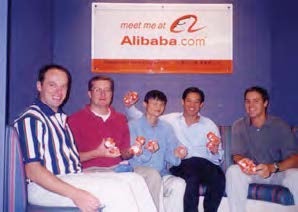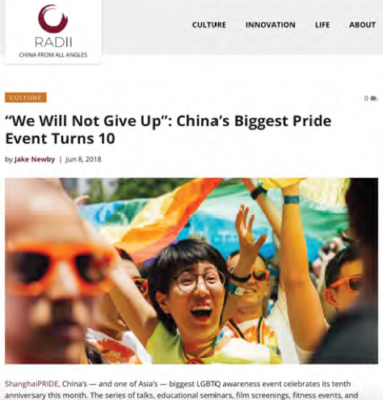In 2017, China Fellow Brian Wong made an Action Pledge to “broaden Western perceptions of China and Chinese culture through the creation of a digital media platform targeting 250,000 U.S. millennial subscribers by March 2018.” That pledge is being made real by his leadership venture, RADII – a digital media platform focused on producing stories about Chinese life, culture, and innovation. In this piece, Brian takes us on his journey.
The Origins
In 1999, I moved from my home in Silicon Valley to Hangzhou, a second-tier city in China. It was an adventure – as a third-generation American with Chinese ancestry, I decided to take the leap back to my great-grandparents’ homeland to join a small internet company that was still in its infancy. It had only about 50 employees at the time, and most of those had never lived or worked outside Hangzhou, let alone China. The company – Alibaba – had no business plan and no technology. Fortunately, it did have a charismatic leader, in Jack Ma, and an audacious dream to become one of the top 10 websites in the world.
In the years that followed, I witnessed an unprecedented transformation take place in China, one that cut across a multitude of aspects of human life in the society here. Not only did Alibaba become one of the world’s top companies, but the technology and infrastructure it created has fundamentally changed people’s lives. It has altered the way people buy and sell, has created trust systems that enable financial institutions to make microloans to millions of people in cities and distant rural areas, and has empowered youth, women, and other previously disenfranchised groups to participate in the mainstream economy through entrepreneurship.

The Early Days: Brian Wong (second from right), Alibaba founder Jack Ma (center) in 2000.
When Alibaba listed on the New York Stock Exchange in 2014, it was the largest initial public offering in U.S. history, raising $25 billion from a throng of enthusiastic institutional investors. It was a miraculous vote of confidence to see so many professional investors willing to take a chance on Alibaba and demonstrate their confidence in our company through their investment in our stock. And as someone who had spent many years at the organization participating in many debates and discussions about the importance of company values and linking them to our business objectives, I felt that those efforts had paid off and demonstrated that it is possible to do good business while doing good for the world.
It was surprising for me then, many months later, to start reading the analyst and investor commentary coming from the naysayers in the industry. In attempting to appear contrarian, they would hurl accusations around about Alibaba to discredit it as a company. Hedge fund manager Jim Chanos insinuated that Alibaba had inflated its financial numbers; Barron’s ran a cover story claiming that Alibaba’s stock was likely to fall at least 50 percent from the IPO due to red flags on corporate governance, conflicts of interest, counterfeit good sales, and many other questionable business practices; reporter Jonathan Laing went so far as to accuse Alibaba of “making up” some numbers because the magnitude of sales reported appeared considerably larger than those of its Western counterparts, Amazon and eBay. These sorts of headlines began to proliferate less than 12 months after the IPO and continued despite consecutive quarters of the company outperforming analysts’ consensus.
As I dug deeper into the criticism, I realized that the accusations were much less about Alibaba as a company, and more about a larger perception of China as a country. Alibaba was simply the latest proxy of China and a convenient target onto which to project the same fears and criticisms related to anything from China that have been building up over the years.
“The truth is that there is more in common between the U.S. and China than we realize. We are just not focusing on these commonalities.”
The Challenge
Most people outside China are still entrenched in the old view of China as a low-cost exporting economy (often manufacturing and exporting fake products or knock-offs) whose business practices are opaque and lack proper governance, and that focuses on the short term and lacks in global capabilities. People do not realize that there is actually a massive opportunity to sell to China’s growing middle class today and that this opportunity requires a much more subtle understanding of what China is becoming in order to successfully engage and reach these consumers.
Misunderstandings between cultures are reflected not only in business perceptions but also in diplomatic negotiations. If one were to do a casual search of news on “U.S.-China” these days, it would be easy to assume that the United States and China are on the brink of a new Cold War.
Part of the reason this misunderstanding exists is that Americans as a whole haven’t taken the time to really understand China. The number of Chinese students in America today is over 300,000, while the number of American students studying full time in China is close to 30,000. For America to understand China and prepare for its rise, it is imperative for Americans to better understand the country and its culture.
The crux of all of this starts with people-to-people understanding. Do individuals from each culture truly understand one another and have an appreciation for how each side sees the world? The truth is that there is more in common between the U.S. and China than we realize. We are just not focusing on these commonalities. And often the best moment to start this sort of dialogue is when members of both sides are young and more open minded.
Together, these factors brought me to the realization that I should do something. Hence I created RADII (www.radiichina. com) as my China Fellowship leadership venture.
More Than Politics and Business
RADII is the plural of “radius,” a mathematical term describing a straight line from the circumference to the center of a circle. Likewise, as the two spheres of East and West converge, our mission is to dive from the surface of China into its core, revealing stories and experiences that present a rounded, fully-expressed, nuanced picture of one of the most dynamic places on Earth and show how China and the West have more in common than we might expect.
As a digital media platform, RADII aspires to tell stories from a grassroots level, enabling individuals in China to share views and perspectives from China on topics that will be of interest to millennials overseas. RADII hopes that these stories can paint a clearer picture of what China is today and inform and educate its readers in a multidimensional way.

Articles about culture, innovation and life seek to bridge understanding between continents.
RADII focuses on three topic areas: culture, innovation, and life. It largely, though not completely, avoids overt discussion of governmental politics because our belief is that political beliefs are ultimately a reflection of one’s values, and one’s values are ultimately influenced by how one perceives the world. Understanding culture, innovation, and life topics helps shape that lens of the world, and RADII hopes to present aspects of China and its culture in a way that is accessible, captivating, and relevant to its readers.
Find Areas of Common Ground First
RADII is not intended to be entirely apolitical or uncritical in regard to China, but through news, storytelling, and in-depth features, RADII demystifies China by showing areas of commonality first. We feature aspects of the country that allow people to relate and understand why China is relevant to their lives. We show that Chinese youth are as much basketball fanatics as Warriors fans in Oakland. We highlight the underground hip-hop scene in Chengdu and show how the beats by local artists are no less “dope” than those of Migos. We also show how China is making strides in organic farming because consumers here also care about the long-term health impact of what they eat. Or we show how acupuncture is more than just superstition but a way to use thousand-year-old practices and theories to actually cure chronic ailments. Or how China’s approach to new retail (the integration of online and offline commerce) is like nothing ever seen in the U.S.
The one thread that ties all of the content together on RADII is its accessibility to the Western reader and the objective to demystify China. Regarding language, religion, or the Chinese cultural practice of saving “face” (pride), sometimes it’s hard to really get beneath the surface of a civilization and culture with such a lengthy history. But as we enter a new era and must confront rapid changes in society and the world, it becomes all the more pertinent for people to understand each other at a fundamental level. This mutual understanding can then serve as a foundation for our politics and diplomacy, which can in turn help us create alliances to focus on the much more pressing and important issues of our generation.
“RADII has provided me the opportunity to pursue a long-term desire of playing a role in bringing the East and West together by debunking outdated thinking on China.”
The RADII team has made some meaningful progress since its launch last July. By traditional online metrics, our monthly active users (MAUs), duration, and bounce rates all point to high-quality traffic and loyal readers. We are a bit short of the commitment target made at the Action Forum, but I am confident we will exceed those numbers and more when we begin to scale. Not only are we operating a robust content site, but we have also organized a number of local events in China to engage our contributor base and attracted over 2,000 attendees to our RADII signature speaker series, The Future of X, where we highlighted key China trends in robotics, music, culture, and art. We plan to organize similar events targeting readers in the U.S. very soon. I am proud of the dedicated and passionate team we’ve set up in China and are now expanding in the U.S. Moreover, we have managed to attract world-class advisers and investors who have committed to back our venture moving forward.
RADII has provided me the opportunity to pursue a long-term desire of playing a role in bringing the East and West together by debunking outdated thinking on China. This would not have been possible before I spent the sufficient amount of time working in China and trying to understand first what the key barriers have been in the past. Now, with the help of the Aspen Institute’s China Fellowship, I feel inspired and motivated to pursue this goal with courage and confidence, knowing that others have traveled similar roads of uncertainty but achieved their goals thanks to a clear vision and the support of a very special community.
This is a time like no other in China’s modern history. And while there are some huge challenges to be resolved, including environmental degradation, the country’s aging population, social stability, and even China’s future role in the world, the possibilities the future holds for its people seem limitless. With RADII, I hope that I can do my small part to improve our future by bridging understanding between China and the world.